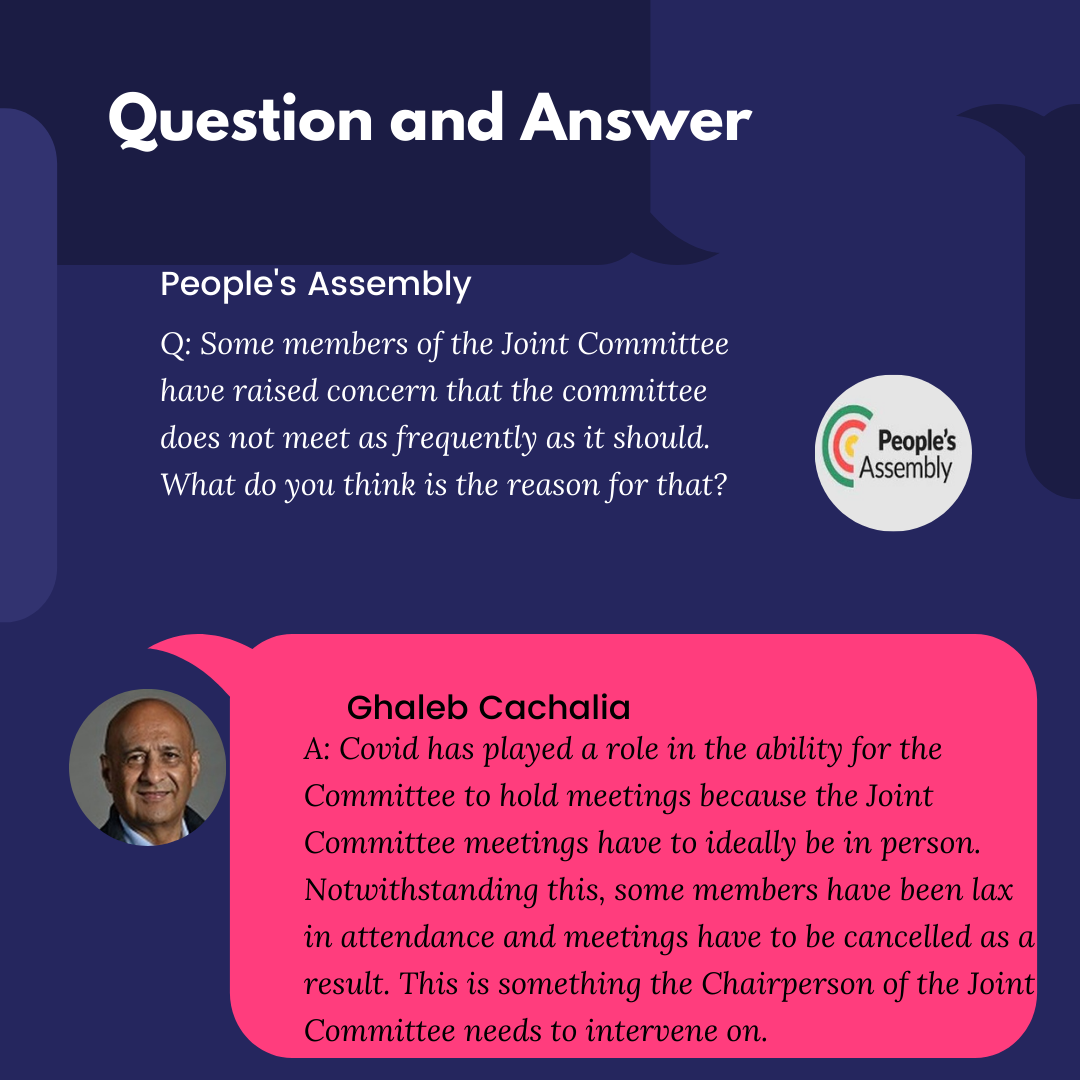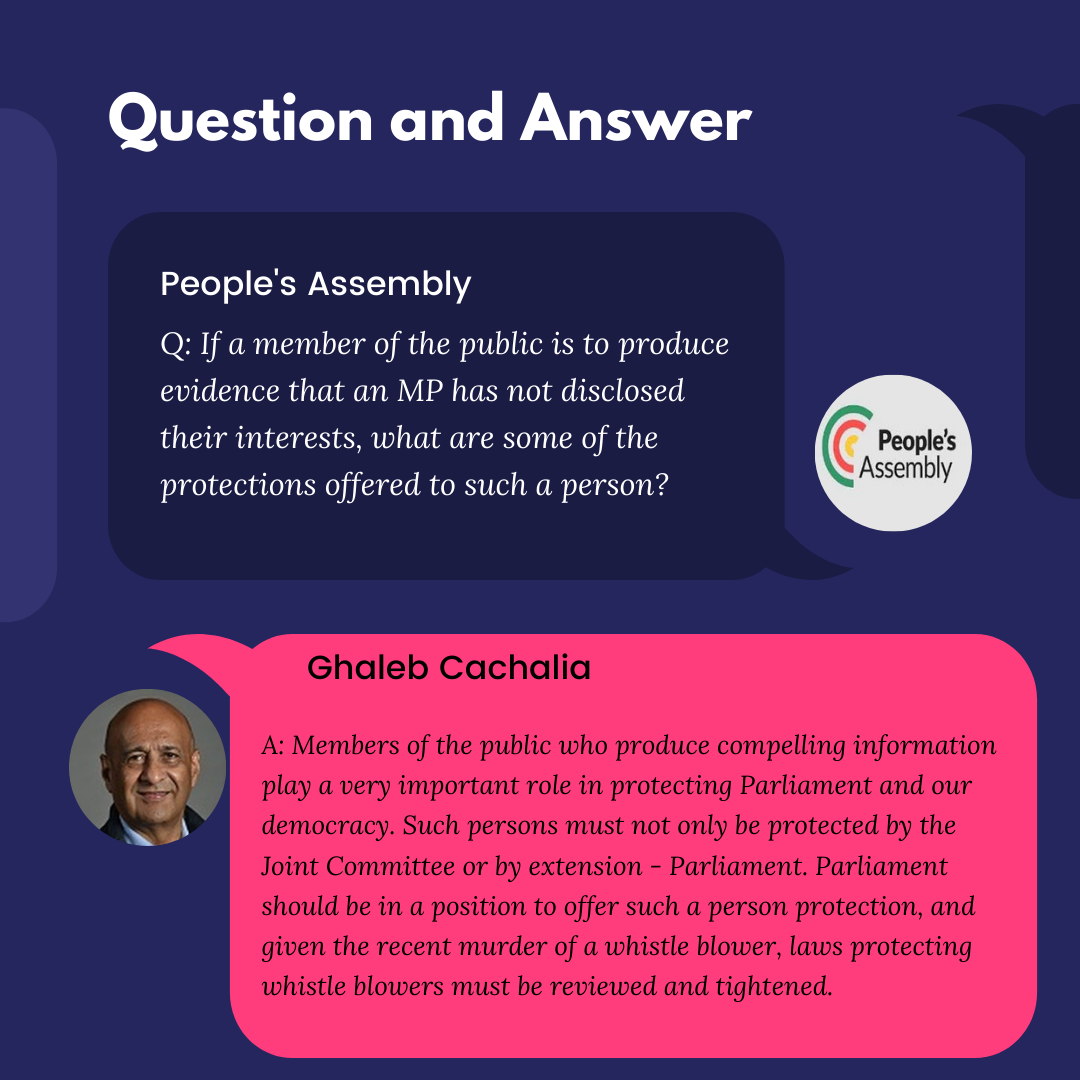
In terms of the Code of Ethical Conduct and Disclosure of Financial Interests (the Code), MPs must disclose their financial interests annually. The following kinds of financial interests are registrable interests and must be disclosed:
-
Shares and other financial interests in companies and other corporate entities; remunerated employment outside Parliament;
-
Directorships and partnerships; consultancies; sponsorships;
-
Gifts and hospitality in excess of R1500, from a source other than a family Member or permanent companion or gifts of a traditional nature provided that this does not create a conflict of interest for the Member;
-
Any other benefit of a material nature;
-
Foreign travel (other than personal visits paid by the Member, business visits unrelated to the Member’s role as a public representative, and official and formal visits paid for by an organ of State or the Member’s party);
-
Ownership in land and property including land and property outside the Republic; pensions; public contracts awarded; trusts and encumbrances.
These interests are compiled into a Register administered by the Office of the Registrar of Member’s Interests in Parliament and overseen by the Joint Committee on Ethics and Members Interest (Joint Committee).
Find the 2020 and 2019 Interest Registers.
Why must MPs declare?
Parliaments across the world require that MPs declare their interests because the nature of their job requires that they uphold the highest ethical standards.
Declaring such interests enhances transparency and strengthens public trust and confidence in parliamentary processes and decision-making.
The interests register upholds the accountability of members to observe the highest standards of behaviour and conduct. The disclosure of interests also helps to ensure conflicts do not arise between a member’s public duty and private interests.
What happens when an MP fails to declare their interests?
MPs can breach the Code of Ethics in the following ways:
- When an MP contravenes or fails to comply with the requirements of the provisions for disclosing interests;
- When disclosing registrable interests, wilfully or grossly negligently provides the Registrar with incorrect or misleading details; or
- A former MP breaches this Code if he/she abuses or makes improper use of Members facilities or any benefit provided to MPs. An MP who fails to declare their interests within the required timeframe, can face penalties in the form of a fine, a reduction in salary or allowances for a period not exceeding 30 days, suspension or can be denied a seat in Parliamentary debates or committees for a period not exceeding 30 days.
Please check full list of penalties here:
These penalties are applied on a case-by-case, depending on the severity of the breach. The Registrar, through the guidance of the Joint Committee, must investigate the reasons why an MP failed or neglected to disclose their interests and apply penalties in accordance with the Code.
The Committee must report its finding and its recommendations as to penalties, if any, to the appropriate House. If the Committee recommends a penalty, the House must either:
-
Accept or reject the recommendations; or
-
Refer the matter back to the Committee for further consideration.
If the House has accepted the Committee’s recommendation, the findings become final and the Speaker or the Chairperson of the Council must act on such a decision promptly.
Why you - as the public - must care about the Register of Interests
It is plain and simple. MPs are your elected representatives and their role is to serve you! Any decision that an MP takes must be in the public’s interest. If an MP deviates from this, and decides to pursue personal or political gains, he or she must be held accountable, and the Register of Interests empowers you to do so.
What is the role of the Joint Committee on Ethics and Members Interests:
The Joint Committee deals with matters relating to ethical conduct of MPs and they oversee the disclosure of MP interests. This Joint Committee was established in terms of the Rules of Parliament - Joint Rule 121 and performs the functions mentioned in Joint Rule 124 in accordance with this Code.
According to Joint Rule 124, meetings of this Joint Committee must be held in closed session. This is especially in instances when the Committee considers a confidential matter affecting a National Assembly (NA) or National Council of Provinces (NCOP) member’s conduct or interests.
Read more about the work of the Ethics and Members' Interest and its members here.
We spoke to member of the Joint Committee on Ethics and Members' Interest Mr Ghaleb Cachalia, and he gave us a glimpse on some of the challenges with the interests register and the ability for the Joint Committee to conduct its work on the interest register.



Comments
Keep comments free of racism, sexism, homophobia and abusive language. People's Assembly reserves the right to delete and edit comments
(For newest comments first please choose 'Newest' from the 'Sort by' dropdown below.)